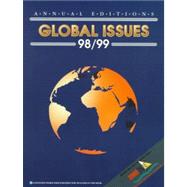|
ii | (4) | |||
| To the Reader | vi | ||||
| Topic Guide | 4 | (2) | |||
| Selected World Wide Web Sites | 6 | (2) | |||
| UNIT 1 A Clash of Views The three articles in this section present distinct views on the present and future state of life on Earth. | 8 | (30) | |||
| Overview | 8 | (2) | |||
|
10 | (17) | |||
|
|||||
|
27 | (5) | |||
|
|||||
|
32 | (6) | |||
|
|||||
| UNIT 2 Population Five articles in this section discuss the contributing factors of culture, politics, environmental degradation, disease, and migration on the world's population growth. | 38 | (32) | |||
| Overview | 38 | (2) | |||
|
40 | (3) | |||
|
|||||
|
43 | (10) | |||
|
|||||
|
53 | (5) | |||
|
|||||
|
58 | (7) | |||
|
|||||
|
65 | (5) | |||
|
|||||
| UNIT 3 Natural Resources Thirteen selections divided into four subsections--international dimensions, raw materials, food and hunger, and energy--discuss natural resources and their effects on the world community. | 70 | (50) | |||
| Overview | 70 | (2) | |||
| A. INTERNATIONAL DIMENSIONS | |||||
|
72 | (4) | |||
|
|||||
|
76 | (5) | |||
|
|||||
|
81 | (3) | |||
|
|||||
|
|||||
|
|||||
| B. RAW MATERIALS | |||||
|
84 | (3) | |||
|
|||||
|
87 | (3) | |||
|
|||||
|
90 | (5) | |||
|
|||||
| C. FOOD AND HUNGER | |||||
|
95 | (5) | |||
|
|||||
|
100 | (5) | |||
|
|||||
|
105 | (2) | |||
|
|||||
|
107 | (3) | |||
|
|||||
| D. ENERGY | |||||
|
110 | (4) | |||
|
|||||
|
114 | (2) | |||
|
|||||
|
116 | (4) | |||
|
|||||
| UNIT 4 Political Economy Thirteen articles divided into two subsections present various views on economic and social development in the nonindustrial and industrial nations. | 120 | (54) | |||
| Overview | 120 | (2) | |||
| A. GLOBALIZATION DEBATE | |||||
|
122 | (5) | |||
|
|||||
|
127 | (4) | |||
|
|||||
|
131 | (6) | |||
|
|||||
|
137 | (5) | |||
|
|||||
| B. CASE STUDIES | |||||
|
142 | (5) | |||
|
|||||
|
147 | (3) | |||
|
|||||
|
150 | (6) | |||
|
|||||
|
|||||
|
156 | (2) | |||
|
|||||
|
|||||
|
158 | (2) | |||
|
|||||
|
|||||
|
160 | (2) | |||
|
|||||
|
|||||
|
162 | (4) | |||
|
|||||
|
166 | (4) | |||
|
|||||
|
170 | (4) | |||
|
|||||
|
|||||
| UNIT 5 Conflict Seven articles in this section discuss the basis for world conflict and the current state of peace in the international community. | 174 | (38) | |||
| Overview | 174 | (2) | |||
|
176 | (6) | |||
|
|||||
|
182 | (4) | |||
|
|||||
|
186 | (5) | |||
|
|||||
|
191 | (6) | |||
|
|||||
|
197 | (5) | |||
|
|||||
|
202 | (4) | |||
|
|||||
|
206 | (6) | |||
|
|||||
|
|||||
|
|||||
| UNIT 6 Cooperation Five selections in this section examine patterns of international cooperation and the social structures that support this cooperation. | 212 | (16) | |||
| Overview | 212 | (2) | |||
|
214 | (2) | |||
|
|||||
|
216 | (3) | |||
|
|||||
|
219 | (3) | |||
|
|||||
|
222 | (4) | |||
|
|||||
|
226 | (2) | |||
|
|||||
| UNIT 7 Values and Visions Four articles discuss human rights, ethics, values, and new ideas. | 228 | (21) | |||
| Overview | 228 | (2) | |||
|
230 | (5) | |||
|
|||||
|
235 | (7) | |||
|
|||||
|
242 | (4) | |||
|
|||||
|
246 | (3) | |||
|
|||||
| Glossary | 249 | (8) | |||
| Index | 257 | (3) | |||
| Article Review Form | 260 | (1) | |||
| Article Rating Form | 261 |








